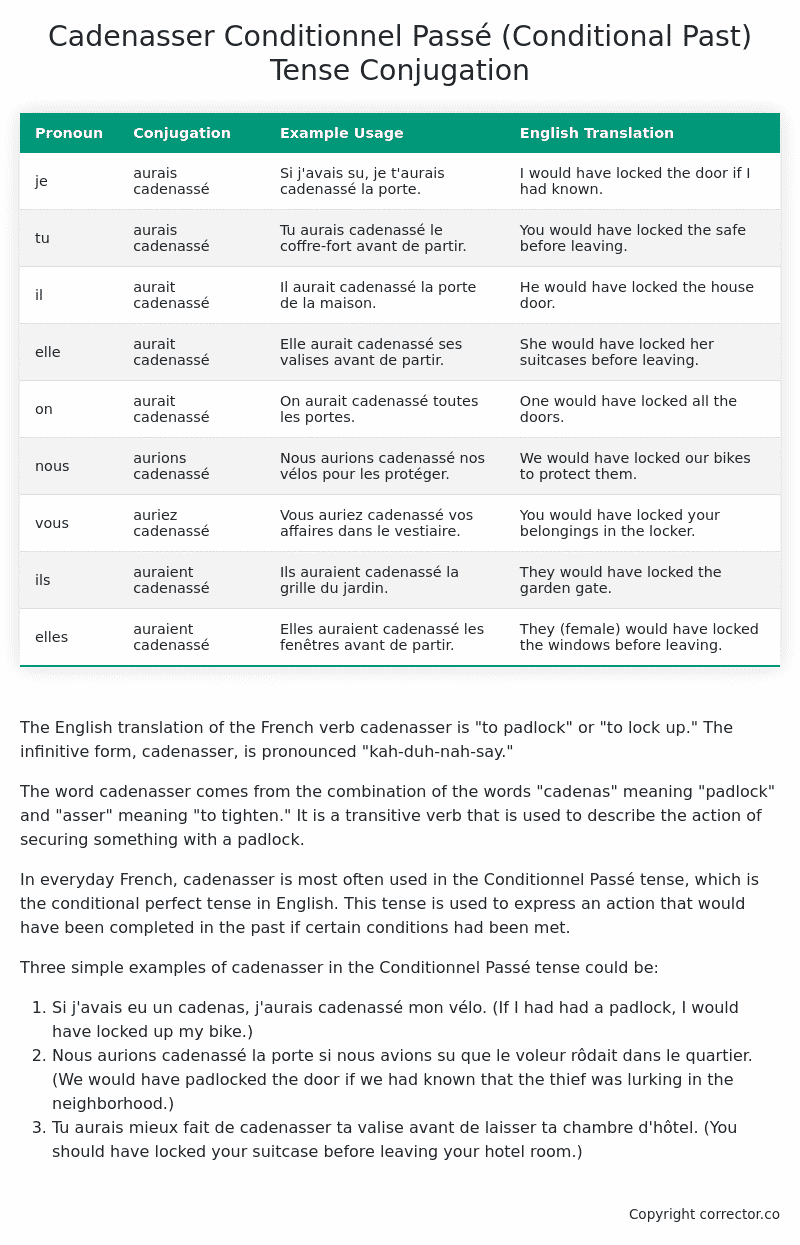Conditionnel Passé (Conditional Past) Tense Conjugation of the French Verb cadenasser
Introduction to the verb cadenasser
The English translation of the French verb cadenasser is “to padlock” or “to lock up.” The infinitive form, cadenasser, is pronounced “kah-duh-nah-say.”
The word cadenasser comes from the combination of the words “cadenas” meaning “padlock” and “asser” meaning “to tighten.” It is a transitive verb that is used to describe the action of securing something with a padlock.
In everyday French, cadenasser is most often used in the Conditionnel Passé tense, which is the conditional perfect tense in English. This tense is used to express an action that would have been completed in the past if certain conditions had been met.
Three simple examples of cadenasser in the Conditionnel Passé tense could be:
- Si j’avais eu un cadenas, j’aurais cadenassé mon vélo. (If I had had a padlock, I would have locked up my bike.)
- Nous aurions cadenassé la porte si nous avions su que le voleur rôdait dans le quartier. (We would have padlocked the door if we had known that the thief was lurking in the neighborhood.)
- Tu aurais mieux fait de cadenasser ta valise avant de laisser ta chambre d’hôtel. (You should have locked your suitcase before leaving your hotel room.)
Table of the Conditionnel Passé (Conditional Past) Tense Conjugation of cadenasser
| Pronoun | Conjugation | Example Usage | English Translation |
|---|---|---|---|
| je | aurais cadenassé | Si j’avais su, je t’aurais cadenassé la porte. | I would have locked the door if I had known. |
| tu | aurais cadenassé | Tu aurais cadenassé le coffre-fort avant de partir. | You would have locked the safe before leaving. |
| il | aurait cadenassé | Il aurait cadenassé la porte de la maison. | He would have locked the house door. |
| elle | aurait cadenassé | Elle aurait cadenassé ses valises avant de partir. | She would have locked her suitcases before leaving. |
| on | aurait cadenassé | On aurait cadenassé toutes les portes. | One would have locked all the doors. |
| nous | aurions cadenassé | Nous aurions cadenassé nos vélos pour les protéger. | We would have locked our bikes to protect them. |
| vous | auriez cadenassé | Vous auriez cadenassé vos affaires dans le vestiaire. | You would have locked your belongings in the locker. |
| ils | auraient cadenassé | Ils auraient cadenassé la grille du jardin. | They would have locked the garden gate. |
| elles | auraient cadenassé | Elles auraient cadenassé les fenêtres avant de partir. | They (female) would have locked the windows before leaving. |
Other Conjugations for Cadenasser.
Le Present (Present Tense) Conjugation of the French Verb cadenasser
Imparfait (Imperfect) Tense Conjugation of the French Verb cadenasser
Passé Simple (Simple Past) Tense Conjugation of the French Verb cadenasser
Passé Composé (Present Perfect) Tense Conjugation of the French Verb cadenasser
Futur Simple (Simple Future) Tense Conjugation of the French Verb cadenasser
Futur Proche (Near Future) Tense Conjugation of the French Verb cadenasser
Plus-que-parfait (Pluperfect) Tense Conjugation of the French Verb cadenasser
Passé Antérieur (Past Anterior) Tense Conjugation of the French Verb cadenasser
Futur Antérieur (Future Anterior) Tense Conjugation of the French Verb cadenasser
Subjonctif Présent (Subjunctive Present) Tense Conjugation of the French Verb cadenasser
Subjonctif Passé (Subjunctive Past) Tense Conjugation of the French Verb cadenasser
Subjonctif Imparfait (Subjunctive Imperfect) Tense Conjugation of the French Verb cadenasser
Subjonctif Plus-que-parfait (Subjunctive Pluperfect) Tense Conjugation of the French Verb cadenasser
Conditionnel Présent (Conditional Present) Tense Conjugation of the French Verb cadenasser
Conditionnel Passé (Conditional Past) Tense Conjugation of the French Verb cadenasser (this article)
L’impératif Présent (Imperative Present) Tense Conjugation of the French Verb cadenasser
L’infinitif Présent (Infinitive Present) Tense Conjugation of the French Verb cadenasser
Struggling with French verbs or the language in general? Why not use our free French Grammar Checker – no registration required!
Get a FREE Download Study Sheet of this Conjugation 🔥
Simply right click the image below, click “save image” and get your free reference for the cadenasser Conditionnel Passé tense conjugation!

Cadenasser – About the French Conditionnel Passé (Conditional Past) Tense
Formation
Common Everyday Usage Patterns
Expressing Unreal Past Scenarios
Polite Requests or Suggestions
Expressing Doubt or Uncertainty
Interactions with Other Tenses
Conditional Present
Indicative Past Tenses
Conditional Future
Summary
Want More?
I hope you enjoyed this article on the verb cadenasser. Still in a learning mood? Check out another TOTALLY random French verb conjugation!


